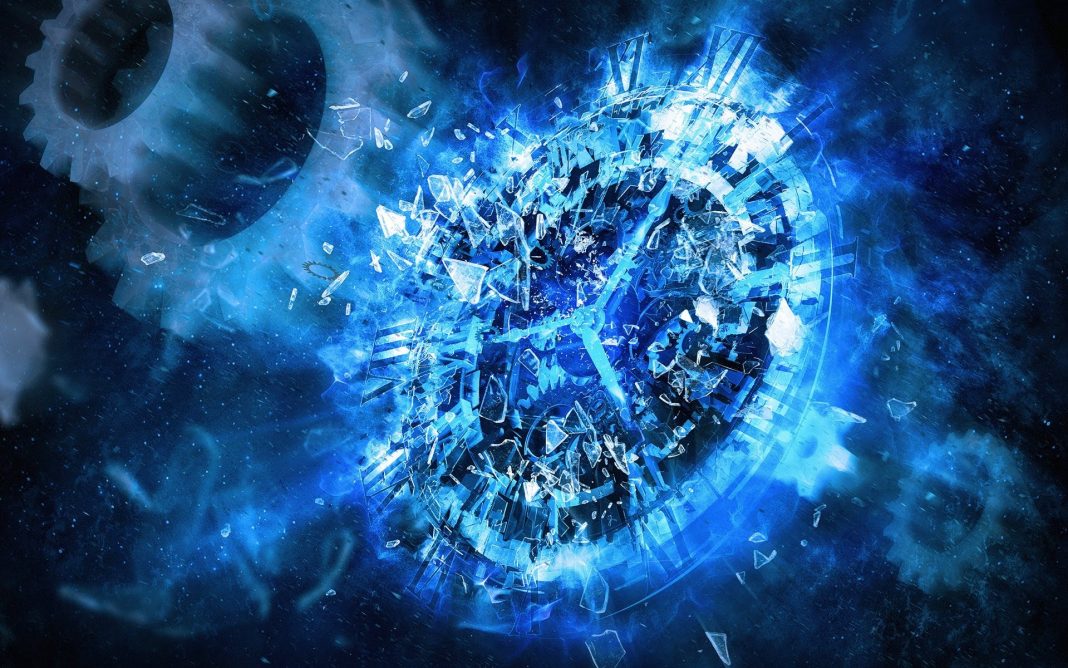A new study in quantum theory, published in the journal Proceedings of the Royal Society A, is proposing that causation can run backward through time, essentially that the future is influencing the past, or now as we speak.
The physicists behind the study reconsidered some basic quantum physics and came to the conclusion that without evidence that time ran in only one direction, then particle measurements could back and forward through time. This is essentially the equivalent of you getting a stomach ache today because of sandwich you will eat tomorrow.
Let’s face it: quantum physics is weird. It comes down to the fact that particles aren’t as solid as they would seem but are instead a cluster of possibilities constantly in motion, more like clouds than pool balls. When we measure particles, the possibility cluster becomes more precise and focused. We can see one definite particle and not all the possible options occurring at once.
However, some physicists believe that the cluster could be something real and not a convenient metaphor for talking about quantum physics. In 2012, Huw Price, a physicist, claimed that if all the possibilities were real, and nothing constrains the direction of time, then instead of saying a theoretical cue ball hitting a theoretical 8-ball into a corner pocket, that 8-ball could come out of the pocket to strike the cue ball.
“Critics object that there is complete time-symmetry in classical physics, and yet no apparent retrocausality. Why should the quantum world be any different?” wrote Price, paraphrasing common opinion in the field.
The physicist behind the latest theory, Matthew S. Leifer fo Chapman University and Matthew F. Pusey of the Perimeter Institute for Theoretical Physics in Ontario questioned if the time should be considered different too when it came to quantum physics.
They applied their own model to Bell’s theorem, an established principle for explaining the strangeness of quantum physics.
John Stewart Bell declared that the weirdness of quantum mechanics could never be understood by observing the actions occurring nearby because, on the quantum, level there was no apparent cause, leading to the conclusion that the Universe is random.
However, what is under consideration now, is the idea that some action happening someplace else or perhaps at another time might be influencing actions from a distance.
So if a certain pair of particles are interconnected, then measuring a characteristic of one of the set automatically sets the value for the other connected particle, no matter where or when in the Universe it is.
Since Bell’s theorem, ‘entanglement’ has been regularly and repetitively tested, firming up weak spots, and standing up to criticisms, which has only reinforced Einstein’s description of ‘spooky’ in the observance of action at a distance.
With retrocausality, a particle would bring the effect of its measurement backward through time to when it was originally entangled and influence its partner.
That is the hypothesis Pusey and Leifer were testing.
“There is a small group of physicists and philosophers that think this idea is worth pursuing,” Leifer said.
As they mixed and matched some typical assumptions, the physicists created a model for Bell’s theorem, exchanging time for space. They theorized that until there was verifiable proof that time had to always move forward, then there would be contradictions.
But the concept of retrocausality is as fringe as it sounds.
“There is not, to my knowledge, a generally agreed upon interpretation of quantum theory that recovers the whole theory and exploits this idea. It is more of an idea for an interpretation at the moment, so I think that other physicists are rightly skeptical, and the onus is on us to flesh out the idea.”
While this isn’t the same as time traveling backward to give yourself next week’s lottery numbers, so far it’s the closest science fiction fantasy as real physics can get. Then again, almost any explanation for the actions of particles at a quantum level will more than likely sound crazy.
In any case, the idea of anything trickling backward in time might not be an appealing one, but let’s face it, when it comes to phenomena like entanglement, nearly any explanation is going to sound downright insane.
More News to Read
- What Does it Take to Build the Super Collider?
- According to a New Study, Early Life Stress Can Change Genes in Brain
- Stunning View of Aurora Borealis from ISS in new NASA video
- Imagine Being Able to Explore the Brain Like a Website
- Quantum Computers Made Even More Powerful with New microchip generating ‘Qudits’











